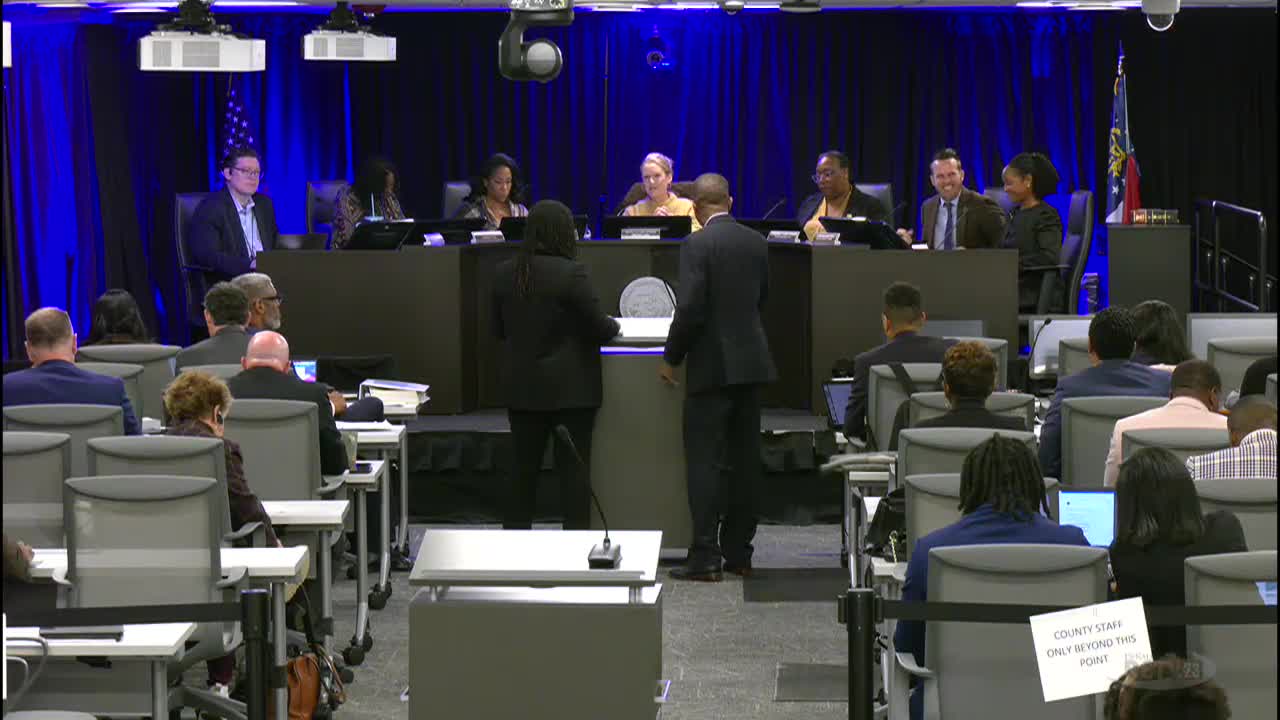DeKalb County told to create equity officer, run communications audit and pursue community equity study
Get AI-powered insights, summaries, and transcripts
Subscribe
Summary
Partnership for Southern Equity presented its three-year internal equity study to the DeKalb County Board of Commissioners at the Committee of the Whole meeting on March 18, urging the county to appoint an equity officer under the CEO, run an internal communications audit and begin a community-facing equity study.
Partnership for Southern Equity presented its three-year internal equity study to the DeKalb County Board of Commissioners at the Committee of the Whole meeting on March 18, urging the county to appoint an equity officer under the CEO, run an internal communications audit and begin a community-facing equity study.
The report — started after the county's June 15, 2020 resolution declaring racism a public health crisis — recommends a six-part set of actions to make internal county operations more equitable and to lay the groundwork for public engagement and resource allocation.
Kazim Woodbury, director of Just Solutions at the Partnership for Southern Equity, said the project began in 2022 with consultations across county administrative and legislative offices and a steering committee. Woodbury and his colleague Jennifer Cobb briefed commissioners on discovery activities that included 20-30 stakeholder interviews, virtual racial equity feedback sessions and an employee survey that drew "almost 300 responses," Cobb said.
Cobb said the team found strong employee commitment to the county but recurring concerns about hiring practices, transparency and professional development. "We defined [equity] as fair and just access to resources and opportunity without barriers," Cobb said, citing the working definition the partnership used to frame its internal review.
The consultants outlined six key recommendations: - Conduct an internal communications audit to ensure employees who work in the field or do not use county email can reliably receive job and training information. - Adopt a policy-evaluation framework so internal policies are screened for equitable impacts before adoption. - Set countywide expectations and accountability for employee training and participation, with performance-evaluation integration. - Appoint an equity officer in the CEO's office to coordinate internal work and serve as a clear point of accountability. - Establish a "Welcoming DeKalb" advisory team to coordinate services and guidance for immigrant and refugee communities. - Commission a countywide community equity study to measure disparities in service and infrastructure and to inform resource allocation.
Commissioners asked for more detail on several points. Commissioner Mereda Davis Johnson sought clarification on which employees lack county email accounts and why some county emails may be filtered or not reached; COO Williams acknowledged follow-up was needed to determine how many staff have and routinely access county email. Commissioner Nicole Messiah pressed the team on how the recommended advisory council and equity officer would coordinate with existing boards, committees and departmental efforts such as workforce development and human services.
Several commissioners expressed support for the recommendations. "DeKalb County is not retreating," said Commissioner Terry, praising the report and urging the board to consider funding next steps during midyear budget discussions. Commissioner David Patrick and others raised anecdotal concerns presented during discovery about differences in transit access, road and sidewalk conditions and housing quality between North and South DeKalb; the consultants said those issues surfaced repeatedly in employee feedback and recommended a follow-up community-facing study.
Woodbury and Cobb said the county-level deliverables include a four-county comparative analysis, a feasibility analysis for an Office of Immigrant and Refugee Affairs and an operational framework to measure equity in policies and programs. They said they would distribute the detailed written report to commissioners and recommended that the chief executive's office and legislative staff partner to implement the next steps.
The presentation prompted several procedural follow-ups at the meeting: commissioners requested the full report be circulated to county staff and placed on a future agenda for formal consideration. Administration staff indicated a forthcoming agenda item would bring the consultant recommendations back to the board for possible adoption and implementation planning.
Ending: The Partnership for Southern Equity report frames internal operational changes and additional community research as the next stage of the county's equity work. Commissioners asked for more data on survey reach and promised to consider funding the proposed implementation steps in upcoming budget discussions.
